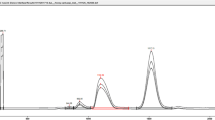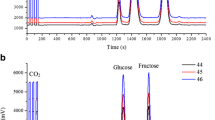Abstract
The Internal Standard Stable Carbon Isotope Ratio Analysis (ISCIRA) or AOAC 998.12 is a method for detecting honey adulteration using C4 sugars, such as cane and corn syrup. This method was developed and used mainly on European honeybees (Apis mellifera) and may not necessarily be applicable to honey produced by other bee species. In this study, the applicability of the ISCIRA method was validated for honeys produced by bees common to the Philippines, namely the native giant honeybees Apis breviligula, the stingless bee Tetragonula biroi, as well as Apis mellifera. Results show that authentic honeys from all three bee species collected across the Philippines (n = 14 for A. breviligula, 13 for T. biroi, and 11 for A. mellifera) displayed ISCIRA indices greater than − 1.0, validating the applicability of the ISCIRA method. Furthermore, removing suspended insoluble pollen from honey via centrifugation and filtration is not recommended as this additional step tends to shift the honey protein δ13C to a more positive value, potentially adding more leeway for C4 sugar adulteration. When the ISCIRA method was used for assessing adulteration in honey products available in the Philippine market, it was found that 12 of 16 (75%) local store-bought, 0 of 41 (0%) imported store-bought, and 64 of 74 (86.5%) local online-bought honey brands were adulterated with C4 sugars. Among the 76 adulterated honeys, 71 (93.4%) contain more than 78% apparent C4 sugar. These results demonstrate the need for stricter honey quality regulations and policies to protect the Philippines’ bee industry and its consumers.



Similar content being viewed by others
References
Abou-Shaara HF (2014) The foraging behaviour of honey bees, Apis mellifera: A review. Vet Med (Praha) 59:1–10. https://doi.org/10.17221/7240-VETMED
AOAC (1998) C-4 Plant Sugars in Honey. Internal Standard Stable Carbon Isotope Ratio Method. Off Methods Anal:44–46
Belina-Aldemita MD, Opper C, Schreiner M, D’Amico S (2019) Nutritional composition of pot-pollen produced by stingless bees (Tetragonula biroi Friese) from the Philippines. J Food Compos Anal 82:103215. https://doi.org/10.1016/j.jfca.2019.04.003
Bogdanov S, Lüllmann C, Martin P, von der Ohe W, Russmann H, Vorwohl G, Oddo LP, Sabatini AG, Marcazzan GL, Piro R, Flamini C, Morlot M, Lhéritier J, Borneck R, Marioleas P, Tsigouri A, Kerkvliet J, Ortiz A, Ivanov T, D'Arcy B, Mossel B, Vit P (1999) Honey quality and international regulatory standards: review by the international honey commission. Bee World 80:61–69. https://doi.org/10.1080/0005772x.1999.11099428
Cervancia CR (2018) Management and Conservation of Philippine Bees. In: Asian Beekeeping in the 21st Century, pp 307–321
Chen CT, Chen BY, Nai YS, Chang YM, Chen KH, Chen YW (2019) Novel inspection of sugar residue and origin in honey based on the 13C/12C isotopic ratio and protein content. J Food Drug Anal 27:175–183. https://doi.org/10.1016/j.jfda.2018.08.004
Codex Stan (1981) Codex Standard for Honey. Codex Aliment Comm
Cotte JF, Casabianca H, Lh J, et al. (2007a) Study and validity of 13 C stable carbon isotopic ratio analysis by mass spectrometry and 2 H site-specific natural isotopic fractionation by nuclear magnetic resonance isotopic measurements to characterize and control the authenticity of honey. 582:125–136. https://doi.org/10.1016/j.aca.2006.08.039
Cotte JF, Casabianca H, Lhéritier J, Perrucchietti C, Sanglar C, Waton H, Grenier-Loustalot MF (2007b) Study and validity of 13C stable carbon isotopic ratio analysis by mass spectrometry and 2H site-specific natural isotopic fractionation by nuclear magnetic resonance isotopic measurements to characterize and control the authenticity of honey. Anal Chim Acta 582:125–136. https://doi.org/10.1016/j.aca.2006.08.039
Cumbao JLT, Alvarez PLJ, Belina-Aldemita MD et al (2016) Total phenolics, total flavonoids, antioxidant activity and antibacterial property of propolis produced by the stingless bee, Tetragonula biroi (Friese) from Laguna Quezon, Philippines. Philipp Entomol 30
Doner LW, White JW (1977) Carbon-13/carbon-12 ratio is relatively uniform among honeys. Science (80- ):891–892
Dong H, Xiao K, Xian Y, Wu Y (2018) Authenticity determination of honeys with non-extractable proteins by means of elemental analyzer (EA) and liquid chromatography (LC) coupled to isotope ratio mass spectroscopy (IRMS). Food Chem 240:717–724. https://doi.org/10.1016/j.foodchem.2017.08.008
Eteraf-Oskouei T, Najafi M (2013) Traditional and modern uses of natural honey in human diseases: a review. Iran J Basic Med Sci 16:731–742. https://doi.org/10.22038/ijbms.2013.988
Fajardo JAC, Cervancia CR (2012) Philippine Apiculture: Status and RD&E Agenda -2012-2016 (A Roadmap for Policy Makers and Stakeholders). UP Los Banos, Laguna
Farquhar GD, Ehleringer JR, Hubick KT (1989) Carbon Isotope Discrimination and Photosynthesis. Annu Rev Plant Physiol Plant Mol Biol 40:503–537. https://doi.org/10.1146/annurev.pp.40.060189.002443
Goncalves MD, Lu C, Tutnauer J et al (2019) High-fructose corn syrup enhances intestinal tumor growth in mice. Science (80- ) 363:1345–1349. https://doi.org/10.1126/science.aat8515
Gonzalez Martin I, Marqués Macías E, Sanchez Sanchez J, Gonzalez Rivera B (1998) Detection of honey adulteration with beet sugar using stable isotope methodology. Food Chem 61:281–286. https://doi.org/10.1016/S0308-8146(97)00101-5
González Martín I, Marqués Macías E, Sánchez Sánchez J, González Rivera B (1998) Detection of honey adulteration with beet sugar using stable isotope methodology. Food Chem 61:281–286. https://doi.org/10.1016/S0308-8146(97)00101-5
Guler A, Kocaokutgen H, Garipoglu AV, onder H, Ekinci D, Biyik S (2014) Detection of adulterated honey produced by honeybee (Apis mellifera L.) colonies fed with different levels of commercial industrial sugar (C3and C4plants) syrups by the carbon isotope ratio analysis. Food Chem 155:155–160. https://doi.org/10.1016/j.foodchem.2014.01.033
Heard TA (1999) The role of stingless bees in crop pollination. Annu Rev Entomol 44:183–206. https://doi.org/10.1146/annurev.ento.44.1.183
Heaton THE (1999) Spatial, species, and temporal variations in the 13C/12C ratios of C3 plants: Implications for palaeodiet studies. J Archaeol Sci 26:637–649. https://doi.org/10.1006/jasc.1998.0381
Kerkvliet JD, Meijer HAJ (2000) Adulteration of honey: Relation between microscopic analysis and δ13C measurements. Apidologie 31:717–726. https://doi.org/10.1051/apido:2000156
Khan SU, Anjum SI, Rahman K, Ansari MJ, Khan WU, Kamal S, Khattak B, Muhammad A, Khan HU (2018) Saudi Journal of Biological Sciences Honey : Single food stuff comprises many drugs. Saudi J Biol Sci 25:320–325. https://doi.org/10.1016/j.sjbs.2017.08.004
Kropf U, Golob T, Nečemer M et al (2010) Carbon and nitrogen natural stable isotopes in slovene honey: adulteration and botanical and geographical aspects. J Agric Food Chem 58:12794–12803. https://doi.org/10.1021/jf102940s
Mandal MD, Mandal S (2011) Honey: its medicinal property and antibacterial activity. Asian Pac J Trop Biomed 1:154–160. https://doi.org/10.1016/S2221-1691(11)60016-6
Mirtschink P, Jang C, Arany Z, Krek W (2018) Fructose metabolism, cardiometabolic risk, and the epidemic of coronary artery disease. Eur Heart J 39:2497–2505. https://doi.org/10.1093/eurheartj/ehx518
Naila A, Flint SH, Sulaiman AZ, Ajit A, Weeds Z (2018) Classical and novel approaches to the analysis of honey and detection of adulterants. Food Control 90:152–165. https://doi.org/10.1016/j.foodcont.2018.02.027
Newstrom-Lloyd DL, Raine I, Li X (2017) Pondering over and under pollen representation. New Zeal. Beekeep.:25–27
Padovan GJ, De Jong D, Rodrigues LP, Marchini JS (2003) Detection of adulteration of commercial honey samples by the 13C/12C isotopic ratio. Food Chem 82:633–636. https://doi.org/10.1016/S0308-8146(02)00504-6
Paul D, Skrzypek G, Forizs I (2007) Normalization of measured stable isotopic compositions to isotope reference scales – a review. Rapid Commun Mass Spectrom 21:3006–3014. https://doi.org/10.1002/rcm
PNS/BAFPS (2016) Philippine National Standards for Honey
Rogers KM, Cook JM, Krueger D, Beckmann K (2013) Modification of AOAC Official MethodSM 998.12 to add filtration and/or centrifugation: Interlaboratory comparison exercise. J AOAC Int 96:607–614. https://doi.org/10.5740/jaoacint.12-386
Sahlan M, Rahmawati O, Pratami DK, Raffiudin R, Mukti RR, Hermasyah H (2019) The Effects of stingless bee (Tetragonula biroi) honey on streptozotocin-induced diabetes mellitus in rats. Saudi J Biol Sci. 27:2025–2030. https://doi.org/10.1016/j.sjbs.2019.11.039
Simsek A, Bilsel M, Goren AC (2012) C / 12 C pattern of honey from Turkey and determination of adulteration in commercially available honey samples using EA-IRMS. Food Chem 130:1115–1121. https://doi.org/10.1016/j.foodchem.2011.08.017
Sommeijer MJ, de Rooy GA, Punt W, de Bruijn LLM (1983) A comparative study of foraging behavior and pollen resources of various stingless bees (Hym. Meliponinae) and honeybees (Hym., Apinae) in Trinidad, West-Indies. Apidologie 14:205–224. https://doi.org/10.1051/apido
Stanhope KL, Medici V, Bremer AA, Lee V, Lam HD, Nunez MV, Chen GX, Keim NL, Havel PJ (2015) A dose-response study of consuming high-fructose corn syrup-sweetened beverages on lipid/lipoprotein risk factors for cardiovascular disease in young adults. Am J Clin Nutr 101:1144–1154. https://doi.org/10.3945/ajcn.114.100461
Tayasu I, Hirasawa R, Ogawa NO, Ohkouchi N, Yamada K (2011) New organic reference materials for carbon- and nitrogen-stable isotope ratio measurements provided by Center for Ecological Research, Kyoto University, and Institute of Biogeosciences, Japan Agency for Marine-Earth Science and Technology. Limnology 12:261–266. https://doi.org/10.1007/s10201-011-0345-5
Tosun M (2013) Detection of adulteration in honey samples added various sugar syrups with 13 C / 12 C isotope ratio analysis method. Food Chem 138:1629–1632. https://doi.org/10.1016/j.foodchem.2012.11.068
White JW, Winters K (1989) Honey protein as internal standard for stable carbon isotope ratio detection of adulteration of honey. J AOAC 72:907–911
White JW, Winters K, Martin P, Rossman A (1988) Stable carbon isotope ratio analysis of honey: validation of internal standard procedure for worldwide application. 610–619
Yang Y, Siegwolf RTW, Kórner C (2015) Species specific and environment induced variation of δ13C and δ15N in alpine plants. Front Plant Sci 6:1–14. https://doi.org/10.3389/fpls.2015.00423
Yoneyama T, Okada H, Ando S (2010) Seasonal variations in natural 13C abundances in C3 and C4 plants collected in Thailand and the Philippines. Soil Sci Plant Nutr 56:422–426. https://doi.org/10.1111/j.1747-0765.2010.00477.x
Zulkhairi Amin FA, Sabri S, Mohammad SM, Ismail M, Chan KW, Ismail N, Norhaizan ME, Zawawi N (2018) Therapeutic properties of stingless bee honey in comparison with european bee honey. Adv Pharmacol Sci 2018:1–12. https://doi.org/10.1155/2018/6179596
Informed Consent
Informed consent is not applicable for this study.
Conflict of Interest
Marco R. Lao declares no conflict of interest. Angel T. Bautista VII declares no conflict of interest. Norman DS. Mendoza declares no conflict of interest. Cleofas R. Cervancia declares no conflict of interest
Funding
This study was funded by the Philippine Council for Industry, Energy and Emerging Technology Research and Development of the Department of Science and Technology (DOST-PCIEERD) with project number 04377.
Author information
Authors and Affiliations
Corresponding author
Additional information
Publisher’s Note
Springer Nature remains neutral with regard to jurisdictional claims in published maps and institutional affiliations.
Supplementary information
ESM 1
(DOCX 48 kb)
Rights and permissions
About this article
Cite this article
Lao, M.R., Bautista VII, A.T., Mendoza, N.D.S. et al. Stable carbon isotope ratio analysis of Philippine honeys for the determination of adulteration with C4 sugars. Food Anal. Methods 14, 1443–1455 (2021). https://doi.org/10.1007/s12161-021-01968-8
Received:
Accepted:
Published:
Issue Date:
DOI: https://doi.org/10.1007/s12161-021-01968-8




